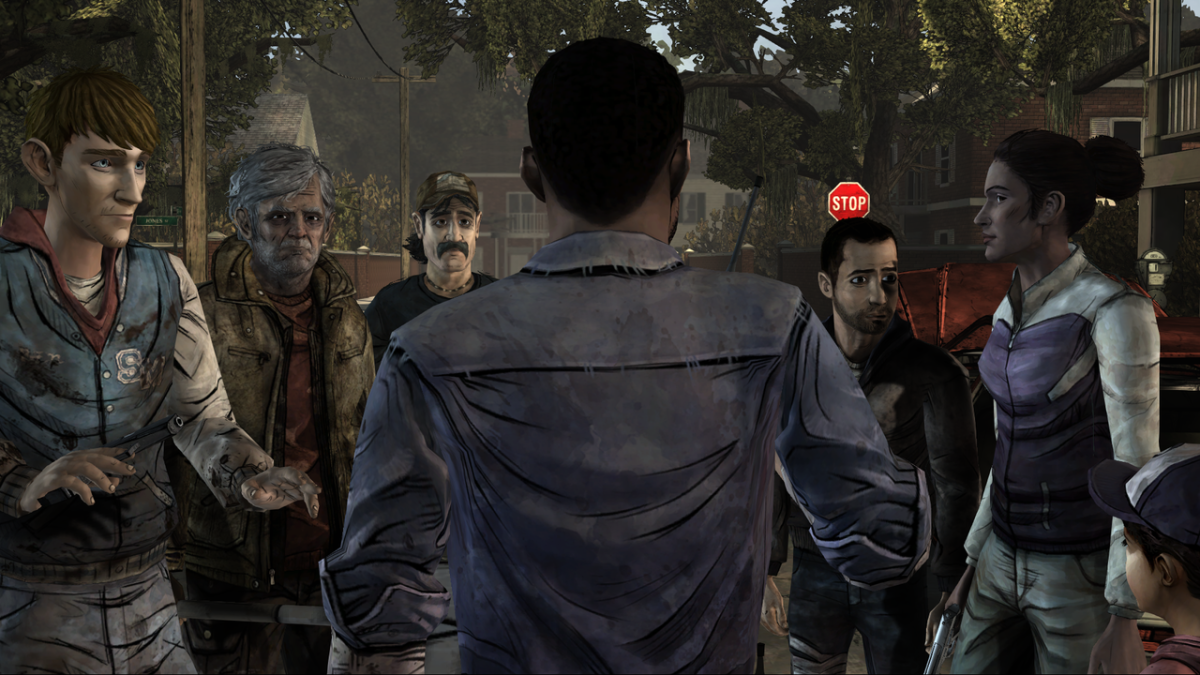Life is full of choices. Choices that you make every day. Cereal or toast? Google or Bing? Dominos or Pizza Hut? Bert or Ernie? All incredibly serious decisions as you can imagine. And gaming is no different. As video games have evolved from being mere coin stealing machines that aimed to rob kids in arcades to mediums of conveying powerful storytelling, the issue of the player’s moral position has come in to the foray when creating these narratives. Fallout, Deus Ex, all of Telltale’s titles like The Walking Dead and The Wolf Among Us, these are all prime examples of how games demand you make a decision that defines your character’s perception to others in the world you populate and, ultimately, define you, the player (as in the real you). So with that, I devise a thesis. That thesis being that while developers offer the freedom of choice within the games they create, they encourage morally positive actions by using a reward system for positive actions and punishments/repercussions for negative actions.
I think developers make a conscious decision on whether they intend to let players’ moral freedom impact negatively or have repercussions for them or not. Take Dishonored for example. Teleporting around the levels and slicing people’s throats, while it is incredibly visceral fun, is discouraged but not explicitly punished. Instead, the game reflects your choices back in the world around you and in a way rewards you by making certain aspects easier in later levels if you took a non-lethal approach throughout your journey, appreciating those who chose to be a noble hero. A game series like Fallout is more casual and arbitrary where your choices and responses are more contained within a certain interaction with a character and determine which faction you align with, so there isn’t much penalty in taking a moral vacation other than Faction A likes you and Faction B doesn’t. Experiences like Deus Ex are more subtle, influencing their narratives in a gentler way and giving back to players who make positive decisions with small gestures like more experience points for knocking out enemies rather than killing them. Deus Ex’s morality impacts more so on the actual story rather than outright affecting the experience of the gameplay.
BioShock makes a good case for my thesis in that it is more blatant with its bias towards positive morality. Even though Rapture is a fallen utopia rampant with twisted monsters, Brigid Tenenbaum is a soothing voice of reason within the submerged tomb of a city, pleading with Jack (the player) to spare the Little Sisters when harvesting their ADAM. By sparing them, you receive less of the genetic currency, meaning it takes longer to upgrade your plasmids, although your generosity is rewarded by the Little Sisters after every 5 or 6 harvests with a unique gift that is only available by saving the girls. Taking the full amount of ADAM (which kills the girls in the process) allows you to progress faster, but the game vocally disproves, locks you out of unique upgrades, and presents you with the “bad” ending upon completion of the game. I think this is clear evidence of the developers encouraging morally positive play throughout the game.
Grand Theft Auto Online is a good instance of developers Rockstar creating failsafes when dealing with morality in a PvP environment. When you enter a GTA Online lobby and look out your apartment window, you can usually see a guy flying around in a jet blowing people up, a team of misfits lobbing grenades at other people’s owned vehicles, and if you step outside you’ll probably get sniped in the head within about fifteen seconds from someone on a skyscraper rooftop. Since the Grand Theft Auto series has themes like criminal activity, chaos, and anarchy entrenched in its DNA, this is completely expected behavior. Rockstar, however, have taken measures to punish negatively moral players by using things like the psychopath system (a mechanic that highlights the position of a player that is only killing other players and grants a reward to the person that kills them), insurance on owned vehicles that forces players that destroy them to pay for them, and cash bonuses for players who abstain from killing others in the open world.
Then you have a studio like Telltale where decision making is arguably the central mechanic that they base their games around. Games like this are something of a special case as there isn’t really a “reward” or “punishment”; it just makes you live with the consequences of your decision. Something like The Walking Dead series is much harder for a gamer like myself to play purely because of this. There is no right or wrong option. There is simply a choice, and from that choice, one side will agree and one side will disagree. One person will love you and another will hate you. By knowing the context of the situation (i.e. a zombie apocalypse), I think it translates from the developer that your choices have a lot of weight to them and shouldn’t be made without consideration and internal deliberation. The fact that a rather short timer is added to the decision making creates an impulsive pressure that, again for someone like me, can almost get uncomfortable and inadvertently cause you to make a decision that you wouldn’t have normally made. This framework creates an environment where the player knows that every decision they make holds a degree of magnitude, to which they could be held accountable for at any time, which I believe can certainly have an influence on how one makes a decision.
After all this, I understand that people are probably reading this thinking “this guy needs to chill out, it’s just a video game." And I get that. But I think that in the same way films evoke feeling by showing us real emotions and real people, video games have progressed graphically, technologically, and cinematically to the point where the capacity for empathy has expanded, so the ability for you to connect with the character you play as in the world in which you participate has become so powerful that I think your moral choices within a game become a key part of your play style and your overall experience.
What other games have you played where developers use morality in their mechanics? Post your favorite examples in the comments below!
Have a tip, or want to point out something we missed? Leave a Comment or e-mail us at tips@techraptor.net













